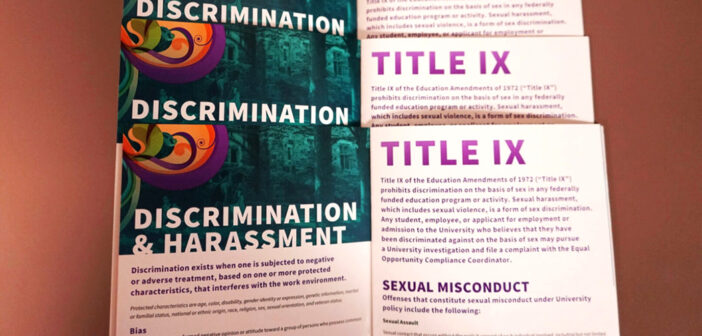The U.S. Department of Education released new Title IX regulations earlier this summer, prompting Lehigh to revise its Policy on Harassment and Non-Discrimination, Lehigh’s Title IX Coordinator Karen Salvemini announced on Aug. 14.
Salvemini worked with a committee of students, faculty and staff to revise Lehigh’s regulations and policies to follow federal guidance under the new Title IX standards. Betsy DeVos, the United States secretary of education, laid out amended requirements for the dismissal of cases brought before Title IX offices at universities across the country.
Those amended requirements can be found on page 26 of Lehigh’s Policy on Harassment and Non-Discrimination, which states: “The Title IX Coordinator must dismiss a formal complaint or any allegations therein if, at any time, it is determined that: the conduct did not occur in an education program or activity controlled by the university (including buildings or property controlled by recognized student organizations).”
Since Lehigh is only allowing first-year students and upperclassmen with extenuating circumstances to live on-campus during the fall semester, a larger than usual quantity of sophomores, juniors and seniors are living off-campus in South Bethlehem. With a large population of the student body living off-campus, and the revised Title IX policies stating the university has no obligation to address off-campus harassment, students took to social media to share frustration with the new amendment.
The new guidance from the federal government focuses on the harassment part of Lehigh’s Title IX policy, not the discrimination part.
Salvemini said in an email statement to The Brown and White she wants to ensure the campus community understands that Lehigh will continue to address off-campus cases in the same manner as the past. Salvemini also wants to assure students that even though the university is operating in a hybrid fashion this semester, the Title IX Office will continue to provide support to those who need it.
Still, Lehigh is required to implement the new regulations or risk a loss in federal funding — which could impact access to financial aid for students — and legal challenges by individuals impacted by the university’s failure to comply with the regulations.
Salvemini explained that if “Lehigh can’t address behavior that we may be required to dismiss under one section of the revised Policy on Harassment and Non-Discrimination,” that Lehigh will work to address that behavior under other processes that were not touched by the changes in federal guidance.
She recognized that after hearing the response to the revised policies, the point that off-campus cases will continue to be handled by the university needs to be made clearer, and her office is working on establishing that communication over the coming weeks.
Salvemini said the conversation surrounding the updated Title IX policies will be one that continues throughout the fall semester.
“Whether I agree or disagree with the changes required by the regulations, or would have chosen such a process to resolve complaints of sexual harassment if I had the discretion to do so, unfortunately as an institution, Lehigh does not have the ability to disregard these legal requirements,” Salvemini said. “We have to implement them.”
Campus community reacts to revised policies
Thomas Golden, ‘18, 21‘G, was a member of the Break the Silence organization as an undergraduate and is in his third year serving as the graduate assistant.
Golden said a significant part of Break the Silence is helping to distribute information about how Title IX applies to Lehigh. The club presents during first-year orientation to explain Title IX to new students.
“From what I can tell, it’s [Title IX amendments] changing the definition of sexual harassment and how sexual harassment cases are handled on campus,” Golden said. “Sexual harassment is an umbrella term and it covers rape, sexual exploitation, stuff like that, so that is going to change a little bit. It sounds like it is going to be a more arduous process.”
Golden said he believes Lehigh’s Title IX office will be able to continue its normal procedures with some technical modifications.
“They should be able to still help students who were sexually assaulted off of Lehigh’s campus, it just would be under an umbrella term,” he said.
Golden said, however, the reporting process for a survivor has been slow in the past, as there is only one person working in Lehigh’s Title IX office.
Lafayette College, a smaller school in comparison to Lehigh, employs four deputy coordinators who hold full-time positions in other areas of campus but work to support the Title IX coordinator, Amanda Hanincik, Lafayette’s Title IX coordinator, said in an email.
Muhlenberg College has one full-time employee in its Title IX office, Lin-Chi Wang, Muhlenberg’s Title IX director, said in an email.
Golden said Break the Silence will be trying to do its part to educate the campus community through a variety of events covering sexual education, how to be a good bystander, how to spot warning signs to prevent assault and how to report assault.
The club will also work to paint consent in a more positive lens through events such as “take back the night” to raise awareness for gender violence and hear stories from survivors.
Jacky Alongi, ‘22, is a member of Break the Silence.
“When I first found out [about the Title IX changes]I was not happy about it because I am living off-campus and I know a bunch of people are living off-campus, but according to Brooke [DeSipio], who is in charge of Break the Silence, and Karen, who works for Title IX, their clarity toward it was you could still file a report if you are living off-campus,” Alongi said.
Alongi said Break the Silence will be working on Zoom presentations and raising awareness through social media about the Title IX changes.
Suzanne Edwards, an associate professor of English and a core faculty member in the women, gender and sexuality studies program, said it’s important to remember Lehigh did not want to make these changes, but rather was dictated by the federal government to be eligible to receive federal funding.
“Its also very clear that the changes to the federal policy were designed to discourage reporting of sexual violence, sexual assault, sexual harassment by turning college proceedings into quasi trials,” Edwards said. “We know that survivors of sexual violence, sexual harassment, sexual assault, sexual exploitation, all of those things, are not inclined to participate in court room proceedings because they tend to be revictimizing experiences.”
Edwards said for Title IX proceedings nationwide, she believes there will be a “chilling effect” on the number of reports.
She said issues that would have formerly been Title IX cases will now be considered Code of Conduct cases because the definition of sexual harassment has narrowed under the federal guidelines governing Title IX.
In practical terms, students who experience harassment will still have options to pursue complaints.
Edwards said she hopes students who seek help and fairness will receive it. She also wants to see Lehigh address gender and sexual-based violence as a structural issue as opposed to an individual issue.
“I really want our students to understand this was not about thinking that this [Title IX amendments] was the best way to serve students who are survivors. [It was about] trying to balance our need for federal funding with the best that we can do under these circumstances,” Edwards said. “I understand we as an institution need to receive federal funding, and that is [also]a question of equity and justice for students on our campus. I wish that we had paired these policy changes with a concrete plan and announcement for investment of funds and how we are going to further protect survivors [in keeping with the new federal guidelines].”
Behaviors including harassment or discrimination, including sexual harassment, can continue to be reported to Salvemini at [email protected], the Lehigh University Police Department, the Gender Violence Support Advocates, or by utilizing one of the online reporting forms. More information about the reporting options, including contact information and links to the reporting forms, are available at https://eocc.lehigh.edu/reporting-options. More information about the resources available on campus and in the local Bethlehem community is available at https://eocc.lehigh.edu/resources.






Comment policy
Comments posted to The Brown and White website are reviewed by a moderator before being approved. Incendiary speech or harassing language, including comments targeted at individuals, may be deemed unacceptable and not published. Spam and other soliciting will also be declined.
The Brown and White also reserves the right to not publish entirely anonymous comments.
2 Comments
If students are concerned about the new federal regulations…VOTE!!
You should be reporting to the police first.